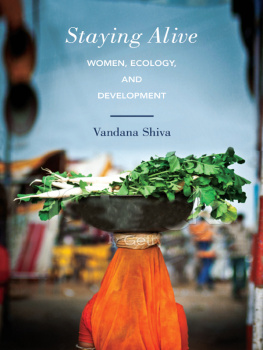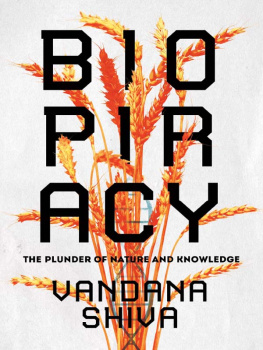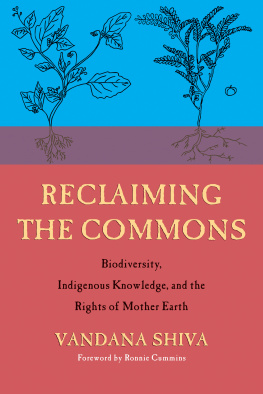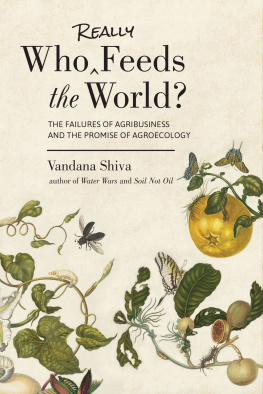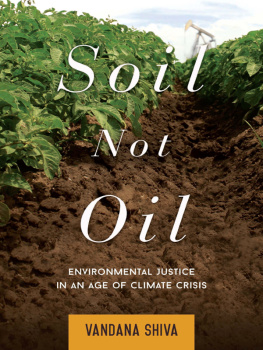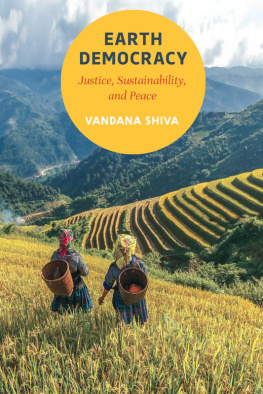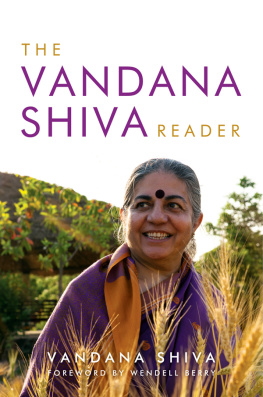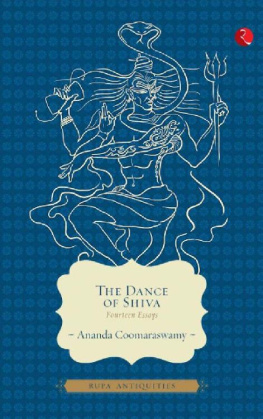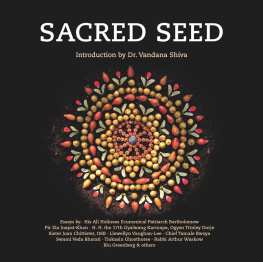
Praise for Staying Alive and
Vandana Shiva
Vandana Shiva is one of the worlds most prominent radical scientists. In Staying Alive she defines the links between ecological crises, colonialism, and the oppression of women. It is a scholarly and polemical plea for the rediscovery of the feminine principle in human interaction with the natural world, not as a gender-based quality, rather an organising principle, a way of seeing the world.
The Guardian
Shiva has devoted her life to fighting for the rights of the ordinary people of India. Her fierce intellect and her disarmingly friendly, accessible manner have made her a valuable advocate for people all over the developing world.
Ms. magazine
A leading thinker who has eloquently blended her views on the environment, agriculture, spirituality, and womens rights into a powerful philosophy.
Utne Reader
The Souths best-known environmentalist
New Internationalist
Shiva is a burst of creative energy, an intellectual power.
The Progressive
Laced with references to Hindu deities, hard-nosed research into Indian land use and bold attacks on Western science since Bacon, Staying Alive has the go of a big personality behind it.
The Observer
STAYING ALIVE
STAYING ALIVE
Women, Ecology, and
Development
VANDANA SHIVA

Berkeley, California
Copyright 1999, 2010, 2016 by Vandana Shiva. All rights reserved. No portion of this book, except for brief review, may be reproduced, stored in a retrieval system, or transmitted in any form or by any meanselectronic, mechanical, photocopying, recording, or otherwisewithout the written permission of the publisher. For information contact North Atlantic Books.
Published by
North Atlantic Books
Berkeley, California
Cover photo iStockphoto.com/ferrantraite
Cover design by Jasmine Hromjak
Book design by Adept Content Solutions
Printed in the United States of America
Previously published in 1999 by Women Unlimited and in 2010 by South End Press.
Staying Alive: Women, Ecology, and Development is sponsored and published by the Society for the Study of Native Arts and Sciences (dba North Atlantic Books), an educational nonprofit based in Berkeley, California, that collaborates with partners to develop cross-cultural perspectives, nurture holistic views of art, science, the humanities, and healing, and seed personal and global transformation by publishing work on the relationship of body, spirit, and nature.
North Atlantic Books publications are available through most bookstores. For further information, visit our website at www.northatlanticbooks.com or call 800-733-3000.
Library of Congress Cataloging-in-Publication Data
Shiva, Vandana.
Staying alive : women, ecology, and development / Vandana Shiva.
pages cm
Includes index.
First published in India [in 1988] by Kali for Women and Women Unlimited.
Summary: Presents a clear case for why our current development paradigm is more accurately characterized as what Vandana Shiva calls maldevelopmentthe violation of the integrity of organic, interconnected and interdependent systems that sets in motion a process of exploitation, inequality, violence, and injustice that is dragging the world down a path of self-destruction, threatening survival itself Provided by publisher.
ISBN 978-1-62317-051-6 (Trade paper)ISBN 978-1-62317-052-3 (E-book) 1. Women in developmentIndia. 2. Human ecologyIndia. 3. PatriarchyIndia. 4. Environmental policyIndia. 5. IndiaSocial policy. 6. WomenIndiaSocial conditions. I. Title.
HQ1240.5.I4S54 2016
305.420954--dc23
2015033602
1 2 3 4 5 6 7 8 9 United 21 20 19 18 17 16
ACKNOWLEDGMENTS
This book is a gift to those who made it possible:
- The many women, peasants, and tribals of India who have been my teachers in thinking ecologically.
- Rajni Kothari, who made such learning possible by creating the context for intellectual freedom.
- Jayanto Bandyopadhyay, my ex-husband, who was my partner in learning.
- Rajuji, my father, who first mothered me and then my son.
- Kartikey, my son, for his generous love which allows me to do what I do.
To my late mother
for her legacy of the courage
to think and act differently
The Gendered Politics of Food and the Challenge of Staying Alive
A griculture, the growing of food, is both the most important source of livelihood for the majority of the worlds people, especially women, and the sector related to the most fundamental of economic rightsthe right to food and nutrition. Women were the worlds original food producers, in terms of the work they do in the food chain, and continue to be central to food production systems in the global South. The worldwide destruction of the feminine knowledge of agriculture evolved over four to five thousand years by a handful of white male scientists in less than two decades has not merely violated women as experts but, since their expertise is modeled on natures system of renewability, has gone hand in hand with the ecological destruction of natures processes and the economic destruction of poor people in rural areas. Agriculture has been evolved by women. Most food producers, farmers, in the world are women, and most girls are future farmers; they learn the skills and knowledge of farming in fields and farms. Women also produce more than half the worlds food and provide more than 80 percent of the food needs in food-insecure households and regions.
Food security is, therefore, directly linked to womens food producing capacity. Constraints on this lead to erosion of food security, especially for poor households in poor regions. Diversity characterizes womens work, their planting and sowing of foodcrops, and the pattern of their food processing. The dominant systems of economics, science, and technology have conspired against women and girls by conspiring againstdiversity. From field to kitchen, from seed to food; womens strength is diversity; womens capacities are eroded when this diversity is eroded.
Economics has rendered womens work as food providers invisible. Because women provide for the household, not the market, they have remained invisible as farmers despite their contribution to farming. People fail to see the work they do in agriculture; their production tends to go unrecorded as work or is seen as being outside the production boundary by economists. There is a conceptual inability on the part of statisticians and researchers to define womens work inside and outside the house (and farming is usually part of both); this non-recognition of what is and is not labor is exacerbated both by the great volume of work that women do and the fact that they do many chores at the same time. Problems of data collection on agricultural work arise not because too few women work, but because too many women do too much work. It is also related to the fact that although women work to sustain their families and communities, most of their work is not measured in wages and is concentrated outside market-related or remunerated work.
Science and technology have rendered womens knowledge and productivity worthless by ignoring the dimension of diversity in agricultural production. According the Food and Agriculture Organization report Women Feed the World, women use more plant diversity, both cultivated and uncultivated, than agricultural scientists have knowledge of. Contrasted with the monocultures promoted by western science, in Nigerian home gardens women plant 18 to 57 plant species. In sub-Saharan Africa they cultivate as many as 120 different plants alongside the cash crops managed by men. In Guatemala, home gardens of smaller than 0.1 hectare have more than ten tree and crop species. In one African home garden more than 60 species of food-producing trees were counted. In Thailand, researchers found 230 plant species in home gardens. In India, women use 150 different species of plants for vegetables, fodder, and health care. In West Bengal, 124 weed species collected from rice fields have economic importance for farmers. In the Espaa region of Veracruz, Mexico, peasants utilize about 435 wild plant and animal species, of which 229 are eaten. Women are the biodiversity experts of the world.
Next page
